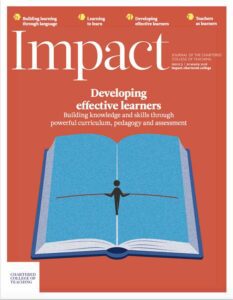Shifting identities: Balancing teaching and parenthood. Ten years on

My doctorate, completed in 2017 at Middlesex University, was all about balancing teaching and parenthood. I examined what it is to be a teacher and parent from both ends of the telescope. From one end, I explored ‘role enrichment’, whereby:
…teachers regularly identify and celebrate the compatibility and mutual benefits of combining the two roles and celebrate the factors that allow them to feel successful in both roles and regularly communicate the ‘joy, excitement, exhilaration and deep satisfaction’ ((Nias, 1996), p. 297) associated with successfully balancing the roles ((Kell, 2016), p. 111).
I also examined the challenges, using the term ‘role conflict’, to describe:
the barriers and the challenges faced by teacher-parents when attempting to balance their professional duties with their family lives; the relationships, policies and demands which prevent them from feeling that they are successful in either one of – or both – roles ((Kell, 2016), p. 27).
These factors were examined within the theoretical framework of Bronfenbrenner’s Ecological Theory (Bronfenbrenner, 1979) (see Figure 1).
Figure 1: Bronfenbrenner’s Ecological Theory

My study concluded that it is indeed eminently possible to balance the two roles effectively, as long as the following factors are in place:
- At micro-level: a strong support network of family and friends
- At meso-level: a school ethos that values teachers as ‘humans first, teachers second’ (Myatt, 2015)
- At macro-level: support for teachers re-entering the profession after time at home with children; a willingness to consider flexible working hours, even at the highest level; a portrayal of the profession as a rich and rewarding one rather than the beleaguered picture that is so often painted.
With my eldest daughter about to enter secondary school, I take the recommendations from my doctoral study and lay them alongside my own lived experience to offer four of my ‘lessons learned’ as a parent and practising teacher – lessons that have helped me survive the most difficult periods and thrive during the most fulfilling times.
Lesson one: Surprises
Neither teaching nor parenting is ever dull. There is no room for complacency. I find that the moment I imagine I’ve ‘sussed it’ is the moment when things start to go wrong, both at school and at home. The moment when my daughter and her friend, aged six, thought it would be amusing to Google ‘naked fat people’. The Year 11 student who stares back blankly and asks ‘What poems?’ when you start to reflect back on the brilliant module you taught last year. Constant reflection, constant re-evaluation is absolutely key to both parenting and teaching.
Lesson two: An interest in teacher wellbeing must never be an excuse for poor practice
‘These children have one bite of the cherry,’ said a deputy head who contributed to my doctoral research. I’ve been blessed with an amazingly good primary school for my daughters and have been very laid-back and hands-off as a parent for the majority of the time. But a whiff of laziness or complacence in my daughters’ teachers will have me drawing lessons from every difficult parent I’ve ever had to face. ‘I sometimes like to imagine the parents of my students lining the walls of my classroom and ask myself whether they would think my lesson was good enough.’ This image (whilst somewhat daunting!) is a powerful one evoked by a research participant.
Lesson three: ‘Good enough’
The ‘good enough’ mantra (Winnicott, 1953) has seen me through many a challenging period. Like many of my colleagues, I have a tendency to ‘throw myself at everything at 100mph’ (my own Mum). With teacher attrition at catastrophic levels, it is more important than ever to pace ourselves – to play the long game. To listen to those who love us and know when to slow down and when to say ‘no’. There is another piece of research to be done on this (any takers?), but my thesis did find that neither guilt nor perfectionism appear to have any useful purpose.
Lesson four: ‘My okay isn’t necessarily your okay’ (Helena Marsh, head teacher)
None of us is perfect. Each of us – teacher, parent, child, pupil – has our own set of talents and our own set of vulnerabilities. Knowing these, in others and in ourselves – knowing that my eight-year-old would rather eat her own elbow than be forced into a dress or that my student Katrin would rather be publicly tortured than praised in front of the class – is absolutely key. More importantly, and this is an ongoing lesson, knowing our own limits is crucial. Being able to be honest about our mistakes and our frustrations with loved ones and trusted colleagues is key. And always, in any school I’ve worked in, finding the ‘safe places’ with the ‘safe people’ where you can hide when things get too much – the guinea pigs in the SEND department or a healing chat with the librarian in the corner by the classics are key to securing our own seatbelts before we reach to secure those of the people we devote ourselves to.
Do we get it right all of the time? Of course we don’t. Do each of these ‘lessons’ have to be relearned a dozen times a month? Of course they do. But is it possible, with a supportive line-manager, a sense of humour and a strong team, to be effective as a teacher and as a parent? Absolutely.










